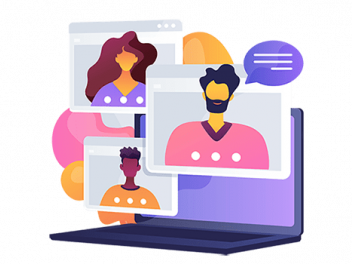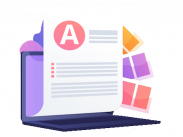As a business owner, you know that an attractive website which speaks to your audience is an essential tool for driving customers to your company, but not being internet tech savvy can mean you don't know what to look for and what questions to ask when hiring a web designer for your new website build.
Before making your decision on who to hire to make your new website, or redesign an existing website, here are some topics and a list of questions that would be good to discuss, to make sure it's a good fit and you choose the right person for your project, whether it's for e-commerce for online sales or a more unusual bespoke build requiring a lot of custom code by the web developer.
Even if you have a referral it's a good idea to go through these questions because different projects and different people have different requirements from their potential web designer.
Some people have exact ideas of what they want in their web design whilst others have only a vague idea. Either way it's okay - website designers are used to dealing with both ends of the spectrum, but it's good to take a bit of time to think about questions like these to formulate an idea -
- What's the goal of your website?
- What functionality does the website need?
- What are your competitors' websites like and what could you do better?
- Who is your target audience and how can your website communicate to them best?
- What words would you want your website to be described as?
- What's your maximum budget?
- How quickly do you need the website online?
Being clear in your own mind about what you're aiming for will make it easier to communicate it to ensure you get the result you're after.
In any case any web designer worth his or her salt will be asking you these sorts of questions to help them understand more about the project, so it's good to be prepared.
IT'S NOT ALL ABOUT THE MONEY... BUT
HOW MUCH WILL IT COST?
This is often at the forefront for many people’s minds because we all have a budget, but we don't like to talk about pricing. Generally the more complex and feature-rich the website design is, the greater the cost as it will require more work. They should be asking you a lot of questions to understand exactly what you need before offering you a quote. It’s a good idea to be upfront about your budget because there’s no point wasting your time and theirs if there’s obviously a money disconnect.
WHAT ARE THE PAYMENT TERMS?
Most web designers require 50% of the total price up front and 50% on completion. If it's a particularly large project there may be a number of instalments along the way instead, generally connected to specific project milestones in the development process. All this should be discussed and detailed in a contract.
WHAT'S INCLUDED AND WHAT'S NOT INCLUDED IN THE PRICE?
Will you be providing all the content for the website or will you need the web designer to provide some or all of it? Do you need images, content writing, a logo design, the domain name?
Be as clear as you can about what you think you’ll need and ask about any additional costs that there might be for any additional content you may want the web designer to supply so that there's better understanding on both sides. (See also SEO below.)
ARE THERE ANY ON-GOING COSTS?
Make sure to ask what platform the website will be built on. Some platforms, known as content management systems (CMS), require a monthly subscription fee just for using the platform, which can get costly in the long run. Many of these platforms also make it impossible to migrate a website away from them so you'll always be paying as long as you want a website up, and you may be vulnerable to any changes in terms of service and prices, or forfeit your website. Ideally you want a website that has no platform fees, like wordpress.org It is an immensely popular CMS, running some 40% of the internet and provides a basis of security and stability yet allows for an almost infinite level of customisation.
Expect a nominal monthly fee for website hosting. Web hosting is an unavoidable cost of having a website – it is the process by which your web files are stored and made ready to be displayed as web pages on the internet. There are many dedicated hosting companies and your website designer should be able to recommend a good solution for your new site.
Your web designer may offer optional website maintenance. This means he/she will look after and maintain your website for you once it goes live, if you don't have the time or inclination to do it yourself. This is usually through maintenance plans which are paid monthly, on rolling contracts which you can opt out of with a month's notice.
If your website requires special functionality, for example an elaborate appointment booking system, your web designer is unlikely to code this from scratch, as it would require hundreds of hours and cost tens of thousands of pounds. Instead he or she will integrate third party dedicated software, called plugins, into your website for that functionality. Some of these technologies can carry a licence fee to use that software, which is usually paid annually. With some website maintenance plans you may benefit from agency licences for plugins that the web designer already holds.
HOW’S IT MADE?
WHAT SORT OF RESEARCH WILL THE WEB DESIGNER DO TO REALLY UNDERSTAND YOUR BUSINESS AND BRAND?
The job of the web designer is to make your company look great to potential customers and stakeholders, as well as integrating into any of your existing digital systems. Although you may provide the content they will need to display and adapt it with an eye to successfully marketing your business, so it's important they grasp the essence and industry of your company.
WHAT PROJECT MANAGEMENT TOOLS AND COMMUNICATION CHANNELS ARE USED?
A good web designer will have a defined flow of work and systems in place to keep everything organised and on track, to prevent project delays. It shows they’re professional and experienced. Also be sure to ask if there will be a dedicated Project Manager or how the design firm delegates responsibilities and accountability.
HOW MANY REVISIONS ARE INCLUDED IF YOU ARE NOT HAPPY WITH A LOOK?
Most web design companies offer project checkpoints which allow for you to approve work along the way. Generally there are 2 – 4 such checkpoints in an average project, but there may be more if the build is particularly large or complex, when you can discuss the progress and any revisions you would like. As you know your target audience best you are the one best placed to approve things like the layout, fonts, user experience, and the general site design.
WHAT CONTENT CAN THE WEB DESIGNER PROVIDE OR SOURCE?
We already mentioned content but the questions to ask when hiring a web designer are crucial because it is a massive topic and your website's success hinges on it. Invariably whatever content you think you'll need for your website, you need to double it. Especially images. That's because some images end up not fitting or not looking good at different sizes or dimensions. Most web designers can create or source content for you if you need it. Some will be outsourced, for example images will likely come from image libraries, but some work will also be done in-house as part of the project, for example photoshopping images to better suit a particular use on your website.
WHAT IS THE EXPECTED DELIVERY TIME FOR THE WEBSITE?
How long the design process and web development will take will largely depend on the complexity of the build, but your website designer should be able to give you a timeline for delivery, so you know when to plan for the launch date.
To help keep things on track be sure to provide content or feedback in good time when requested by the web designer. Reply to emails promptly and comprehensively. Also be sure to get all permissions in your company signed off before the build starts to prevent necessary delays.
And if you have a strict deadline always allow extra time for those unexpected issues or changes before the end product is ready.
CAN YOU SEE THE WEB DESIGNER'S PORTFOLIO OF WORK AND TESTIMONIALS?
Most web designers have a portfolio of their work and case studies on their website and testimonials or reviews, so take the time to check these out. Look at the variety of projects they've worked on. Their portfolios should be able to tell you a lot about their abilities in terms of design, creativity, skill level, and if these are in alignment with what you’re looking for. If you’d like to speak to one of their former clients, ask them to put you in touch, or do so through their own websites.
WILL THE WEBSITE BE RESPONSIVE?
About 50% of website visitors use mobiles so it's crucial that your website looks good on all popular devices of different sizes and formats. In fact Google may penalise a website's ranking if it's not responsive.
WILL THE WEBSITE BE HOOKED UP TO ANALYTICS TOOLS?
To help you know more about your website visitors, Google analytics tools offer insights such as who visits your website, where they are from, the pages they view, the most popular content and so on. This can be extremely useful data to drive ad campaigns, create more content your visitors want and even product development, so your website should be hooked up these analytics.
WILL WEBSITE SPEED & SECURITY BE FOREFRONT OF THE WEBSITE BUILD?
No one can guarantee 100% security in your online presence but industry standards should be used to secure your website as much as possible and your web designer should build in relevant precautions. You may also want to take out insurance against security breeches especially if you hold visitors' data or if there could be loss of earnings or other losses to yourself or others in the event of a security breech.
Page load speed is an important Google ranking factor because Google wants to serve the best content to their clients too and it's been found that if a web page takes longer than 3 seconds to load, it will lose visitors. This could mean lost business for you, so it's essential that your website is optimised for speed. You can test your website speed with tools like GTMetrix.
WILL THE WEBSITE INCLUDE BASIC SEO?
SEO or Search Engine Optimisation is the process of making your website attractive to search engines so that it gets higher rankings. Basic SEO includes for example optimising images, alt tagging, giving headings the correct HTML tags, security certificate, including internal and external linking and more. The web designer should integrate these into the build from the start.
He should also advise on how to make your content keyword appropriate for your target search terms and advise on local SEO if your business targets a local area rather than being national or international.
However as SEO is such a vast area, with on-going input necessary, any advanced optimisation will usually be charged as additional SEO services.
AFTER CARE
DOES THE WEB DESIGNER OFFER A HANDOVER LESSON?
If you're going to maintain the website yourself it's important that the web designer explains the basics of how to do that to you. Obviously it won't be a full developer course but your web designer should offer a 20-30 minute handover lesson as an overview to allow you to login and look after the basics yourself.
DOES THE WEB DESIGNER OFFER ON-GOING SUPPORT?
Although discussing after care may not seem the obvious questions to ask when hiring a web designer, before the project has even started, but you don't want to hire a web designer only to have them vanish once the website is complete. Even if you choose to maintain the website yourself, if you run into difficulties will there be someone you can call and what are the hourly rates to fix any problems?
If you wish to take up a maintenance plan does the web designer offer different packages so you pay for what you need rather than having a blanket plan which you may never use most features of ?
FINAL THOUGHTS ON QUESTIONS TO ASK WHEN HIRING A WEB DESIGNER
Hopefully, this will help you with the right questions to ask when hiring a web designer, to assist you in the best practices for your selection process and to filter the solution for your project to make the entire process smooth sailing.
Ultimately it's about feeling they get your needs and are able to deliver them, being within the right budget and making sure you're getting the product and service you think you've signed up for.
And make sure you get it all written in a contract!
Questions To Ask When Hiring A Web Designer last updated October 2022



